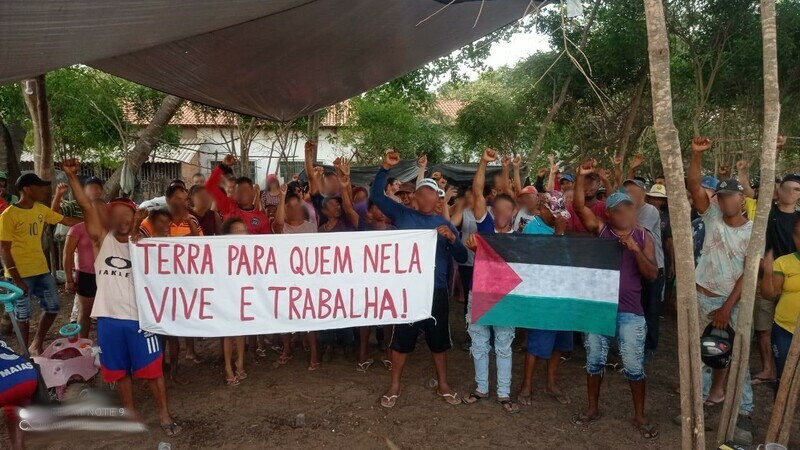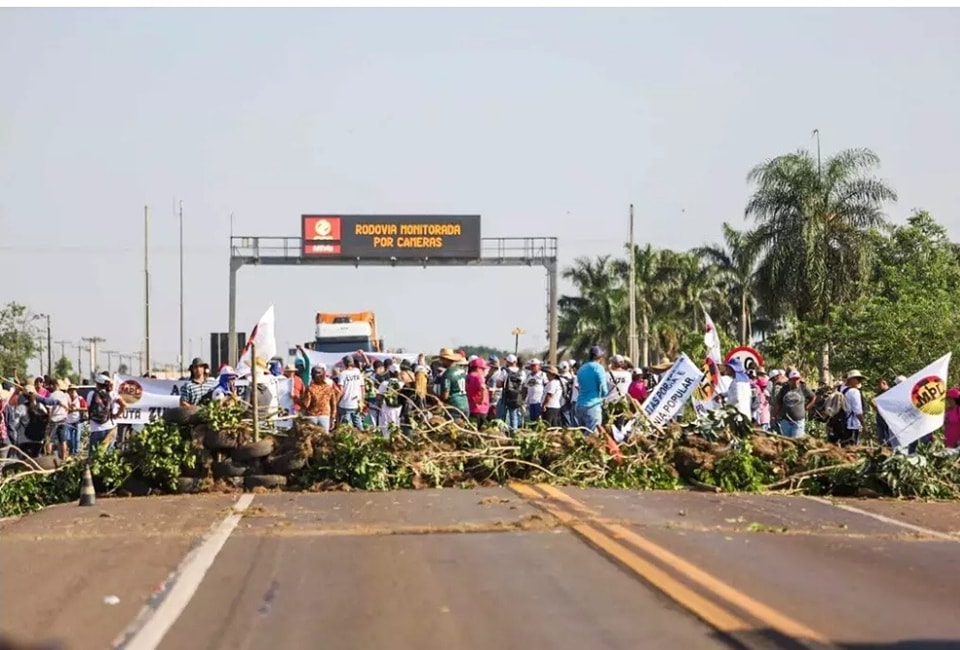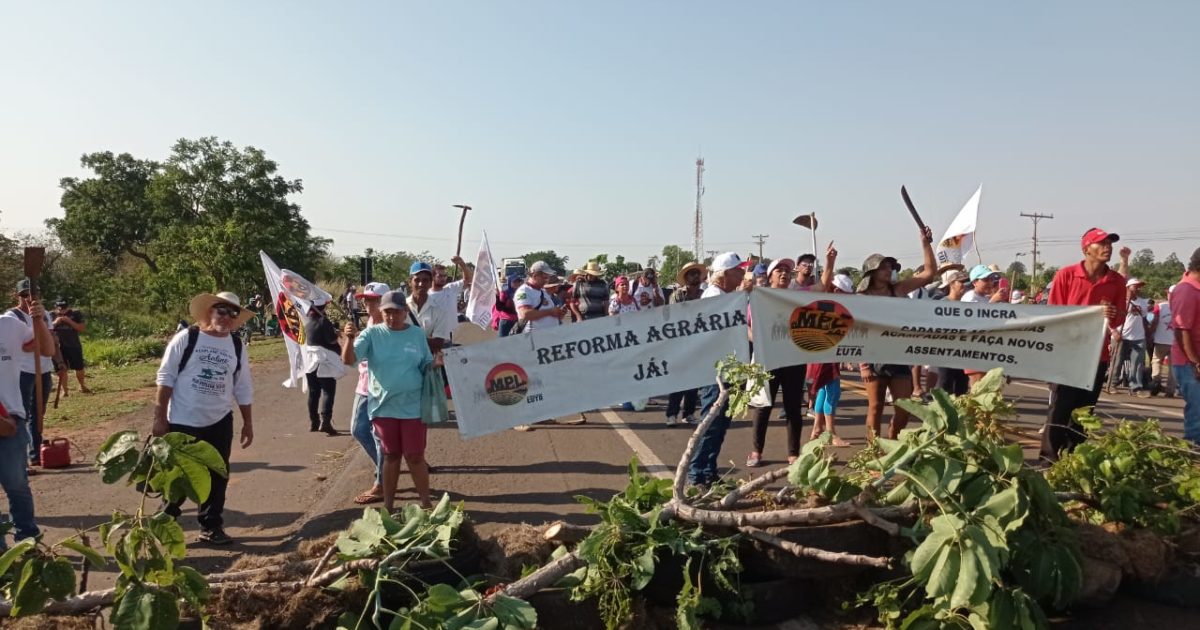Brazil:
On October 7, more than 130 peasant families, with the support of the League of Poor Peasants, reclaimed lands in the town of Mocambinho, in the state of Minas Gerais.This land which in the past is currently part of the largest irrigation project in Latin America called " Jaíba". This does not benefit the poor farmers of the region and has led to the bankruptcy of many poor and small farmers who operate small irrigation systems themselves, while the profits flow into the "Jaíba" project, which is in the hands of large landowners. At the same time, many poor farmers in the region lack land to feed themselves and their families, which is why the peasant families have announced that they will reclaim the entire 18,500 hectares of the "Jaíba" project.
The article in the revolutionary Brazilian newspaper A Nova Democracia speaks of reconquest because there was already an occupation of the land of the "Jaíba" project by peasant families in 2015, but at that time they were evicted by the military police on direct orders from the Jaíba Irrigation District (DIJ) and at the behest of Governor Pimentel.At that time, a year before the elections, local politicians promised legal protection for families and guaranteed access to land and affordable housing. Eight years later, nothing remains of these promises but a situation of misery in which peasant families are forced to live on day labor and compensation. The families have no labor rights, no social security and no accident insurance. They are subjected to the worst working conditions in the region and are harshly exploited by the local landowners and labor agencies.

Together with the poor peasants who suffer from the monopoly of the irrigation project in the region, the peasant families have been resisting this policy for decades with road blockades and occupations of government offices, among other things. According to the reports, the attraction of this struggle with the support of the League of Poor Farmers can be seen in the fact that every day more families, including many women with children, join the struggle for land.
On October 23, poor and landless peasants organized in the Movement of Popular Struggle (MPL) blocked highways in three cities in the Brazilian state of Mato Grosso do Sul to demand their right to land and their democratic rights. As part of these blockades, the poor and landless peasants and activists of the MPL distributed more than 5000 leaflets to stopped vehicles. These blockades were part of the Day of Struggle for Land, Work, Housing and Popular Sovereignty called by MPL to demand the federal government, the Ministry of Agriculture and the National Institute for Agrarian Reform to hand over the land to the poor and landless peasants. A spokesperson MPL summarized the situation in an interview with a local radio station by saying that farmers are tired of waiting for land reforms and are ready to go out and fight for their right to land. In the state capital, about 100 farmers blocked the highway for more than five hours, causing a traffic jam of 14 kilometers. The blockade finally lasted until representatives of the Institute for Land Reform from Brasilia came to the city for a meeting. Also in the city of Naviraí, the farmers reached the representatives of the Institute were forced to offer a meeting with them. The representatives of the authorities were threatened to immediately block the road again if the talks did not take place.

According to a regional director of the Institute for Land Reform, in the state of Mato Grosso do Sul alone, between 6,000 and 7,500 families organized in 18 different social movements are camping out in their struggle for a piece of land on which they can live and work. A coordinator of the Popular Struggle Movement commented on this statistic in an interview with the newspaper A Nova Democracia, saying that many of the peasants and their families who were eventually part of other leftist movements increasingly feel unrepresented by them, in part because these movements would be at the service of bourgeois parties. Therefore, according to the assessment of the coordinator of the MPL, more and more peasants are choosing the path of struggle and against the bureaucratic path. To meet these demands with struggle is the task of the MPL, the coordinator concluded.

Mexico:
In the southeastern state of Puebla, in the municipality of Altepxi, various organizations of the Mexican popular movement met in a Peoples' Assembly in Defense of Water and Life to draw attention to what they see as an imminent war against the peoples by the old Mexican state. The assembly denounced that large imperialist corporations are increasingly taking control of water, while the territories of indigenous peoples and poor peasants continue to be militarized by state and parastatal agencies in order to maintain the exploitation and theft of indigenous and peasant livelihoods. The assembly further states that the consequence of this state of exploitation and oppression must be that the organizations of the popular movement come together and jointly develop forms of struggle, defense and resistance.
Also, the revolutionary news site Solrojista recalls that October 27 is the first anniversary of the murder of comrade Jesús Manuel García Martínez, "Chu Pau". "Chu Pau" was shot last year by an armed commando in the municipality of Santa Cruz Tagolaba. A community heavily involved in the resistance against imperialist megaprojects. This assassination was carried out by the mercenary and lumpen gang of "Tacho Canasta", which is doing the dirty work in service of the old Mexican state and imperialist corporations to build the inter-oceanic corridor, threatening, dispossessing and killing poor and indigenous peasants.
All images are taken from the linked articles.










